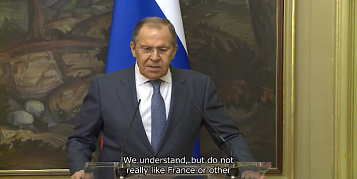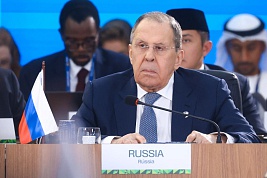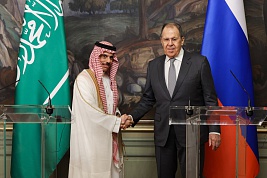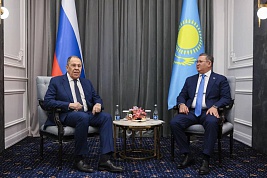Foreign Minister Sergey Lavrov’s statement and answers to media questions at a news conference following talks with Minister of Foreign Affairs and International Cooperation of the Republic of Mali Abdoulaye Diop, Moscow, May 20, 2022
Ladies and gentlemen,
I am delighted to welcome to Moscow my colleague and friend, Minister of Foreign Affairs and International Cooperation of the Republic of Mali Abdoulaye Diop. We held substantive talks on bilateral cooperation and on the current global and African agenda.
Our countries are resolved to continue strengthening the traditionally friendly Russian-Malian ties, which are immune to the vagaries of international affairs. Based on the results of the Malian Foreign Minister’s visit to Moscow, we have mapped out ways to build on our cooperation in various spheres.
We had a detailed discussion of economic matters. We both think our trade is well below our potential in absolute terms, despite the positive growth over the past three years. As such, we agreed to help promote practical cooperation in promising areas such as mining, geological exploration, energy, infrastructure, agriculture and internet technologies. We focused out attention on the practical aspects of organising the delivery of Russian wheat, mineral fertilisers and petrochemicals which Mali badly needs amid the illegitimate Western sanctions.
We noted the positive dynamics of our military and defence industry ties. We value our cultural and humanitarian cooperation, including the training of Malian professionals in a broad range of fields at Russian universities.
We expressed gratitude to our friends for the substantive and detailed information about the current situation in Mali and the efforts of the national leadership to restore internal stability and create conditions for holding free and democratic elections in due time. We know that the restrictions introduced early this year by the Economic Community of West African States and the latest EU sanctions are a heavy burden on Mali’s economy. This is seriously complicating the far from simple situation of the Malian people and hindering the resolution of urgent problems in the country, the biggest of which is the threat of terrorism. We know about sanctions from our own experience. It can be said with certainty that sanctions do not help attain the goals sought by the organisers of such illegal pressure.
Obviously, the decision of Paris and Western allies to wind down the counterterrorist Operation Barkhane and the activities of the European Takuba task force in Mali do not contribute to restoring security. There is a real threat of enclaves with power vacuums emerging, where militants from different illegal units can do whatever they want. They have already prepared for action. This threatens the country’s territorial integrity. We have told our French colleagues about this more than once. Their dissatisfaction with the Malian leadership asking for help from outside sources of protection and security is quite simply a relapse of the kind of colonial thinking that the Europeans should have done away with long ago.
We reaffirmed the willingness of Russia as a permanent member of the UN Security Council to continue contributing to normalisation in Mali and rendering comprehensive aid on a bilateral basis, in part, to enhance the combat capabilities of its armed forces and the preparedness of its military and law-enforcement personnel.
We regularly exchange assessments of the situation in the Sahara-Sahel zone and West Africa, including Guinea, Burkina-Faso and Chad, as well as in Libya. Our Malian friends share our view that Africans themselves should primarily settle domestic political crises in Africa in the interests of Africans. The job of the international community is to provide them with the necessary support. This is what Russia is doing.
We thanked our Malian friends for supporting Russian resolutions at the 76th UN General Assemby session. The Malian delegation backed all our initiatives. We agreed to enhance coordination in the UN and other international platforms. We intend to do this at the recently established New York-based Group of Friends in Defense of the UN Charter.
We touched on the situation in Ukraine and around it, in part, in the context of yesterday’s UN Security Council meeting on global food security. The Western countries again tried to place the blame at the wrong door. They alleged that the crisis they created entirely by themselves, is only rooted in what is now happening around Ukraine and blamed Russia for everything.
We reminded our Malian friends in detail today of what was happening in Ukraine in the past years, including the long eight years when it flatly refused to fulfil the UN Security Council resolution on the Donbass settlement. We again explained to them why we had no choice but to launch the special military operation, during which all our apprehensions about Western designs for the future of Ukraine were fully confirmed. We will fulfil all tasks set by President of Russia Vladimir Putin – to protect civilians in Ukraine (primarily Donbass) and prevent direct threats to our national security from emerging.
I would like to thank our colleagues for the useful talks and the invitation to visit Bamako, which I certainly will.
Question: Russia has stepped up cooperation with Mali and other countries that have traditionally been under French influence. Given the circumstances, is there a risk that the confrontation between France and Russia in Mali will increase? Does Moscow plan to talk with Paris regarding cooperation in these countries?
Sergey Lavrov: I agree with what my colleague had to say. Since your question is about Russia-France relations amid the African developments, I have the following to say. We understand, but do not really like France or other EU countries’ attempts to claim dominance in a particular region, including Europe. When Russia was developing – as it continues to develop – close contacts with Serbia, Bosnia and Herzegovina, and other countries in the Western Balkans, already then High Representative of the EU for Foreign Affairs and Security Policy Federica Mogherini stated rather categorically that the EU was concerned about Russia’s attempts to “infiltrate” the Western Balkans, because they are the EU’s domain.
Speaking of Africa, I met with French Foreign Minister Jean-Yves Le Drian and current High Representative of the EU for Foreign Affairs and Security Policy Josep Borrell during the UN General Assembly session held in New York in September 2021. Both of them expressed, in a rather tense manner, their concern about Russia expanding contacts with Africa, in particular, Mali. They laid out their position in a rather colonial manner: Africa is the EU’s area of responsibility, influence and interests. I cannot accept arguments of that kind, because this is pure neo-colonialism and inability to part with the old habits that led Africa to a critical condition back then. Echoes of the colonial past can still be felt, including the borders between African states that were drawn without account taken of any factors other than the colonial possessions of certain powers. There are other difficulties that our African friends are now facing. I rejected these claims and reminded our EU partners (speaking of who was historically present where) that when it comes to the territories contiguous to the Russian Federation, they do not hesitate to come up with a variety of strategies (the Arctic strategy, or the Central Asian strategy) and then offer these strategies to the countries of the region. Not to mention how deep the EU has established itself in Ukraine. They have been developing various programmes there for many years after Ukraine gained independence. We did not say anything to them as they were operating quite freely next to the Russian Federation’s borders. These double standards are sad. We are ready to discuss any international matters with our Western colleagues from France or anywhere else, but on one condition: We will do so in a civilised manner and with respect for each other’s interests and, most importantly, for the right of any region or any country in question (in this case, Mali) to choose partners freely and without any dictates. Our French colleagues are now trying to dictate to Mali who they can or cannot communicate with. This is unacceptable and does not make the French Republic or French manners look good.
Question (retranslated from French): Mali has a clear plan for tomorrow which is to receive hydrocarbons. Is Russia ready to provide these hydrocarbons to Mali?
Sergey Lavrov: We made clear earlier that Minister Diop’s current visit focused on current and future bilateral ties across all areas, primarily, trade and the economy. The delegation led by the Minister includes heads of other ministries, including the Ministry of Transport and Infrastructure, the Ministry of Economy and Finance, and the Ministry of Mines, Energy and Water, meaning that Mali is serious about pursuing specific agreements. The delegation has already had and will have more meetings with specific departments and ministries of the Russian Federation. We can talk about results already. We will pursue these agreements through the Foreign Ministry as the coordinator of our relations with foreign countries, in this case, our friends from Mali.
The talks touched on the matters that you mentioned, including deliveries of wheat, fertilisers and petroleum products. All these matters are being handled by the relevant agencies. Based on this visit’s results, we will submit proposals to the Government of the Russian Federation.



